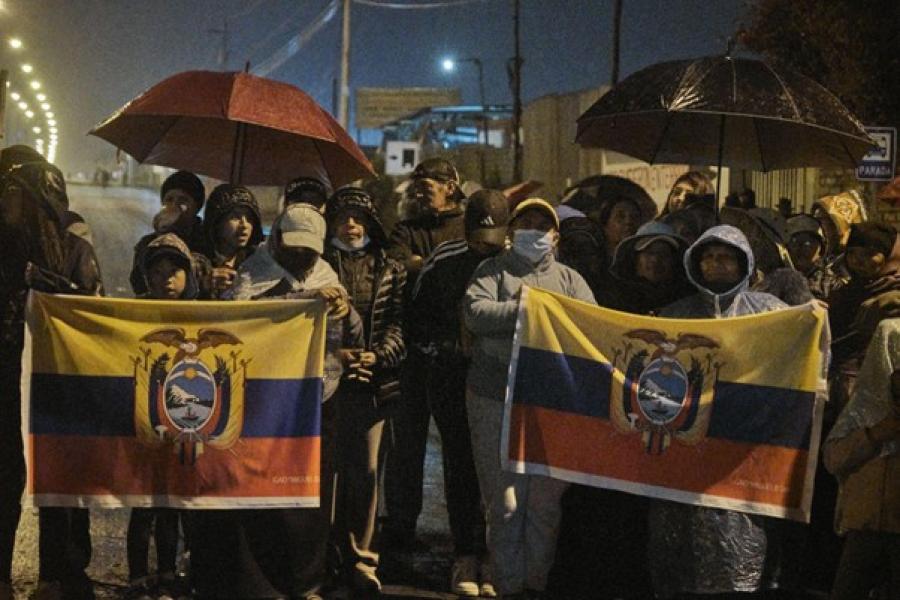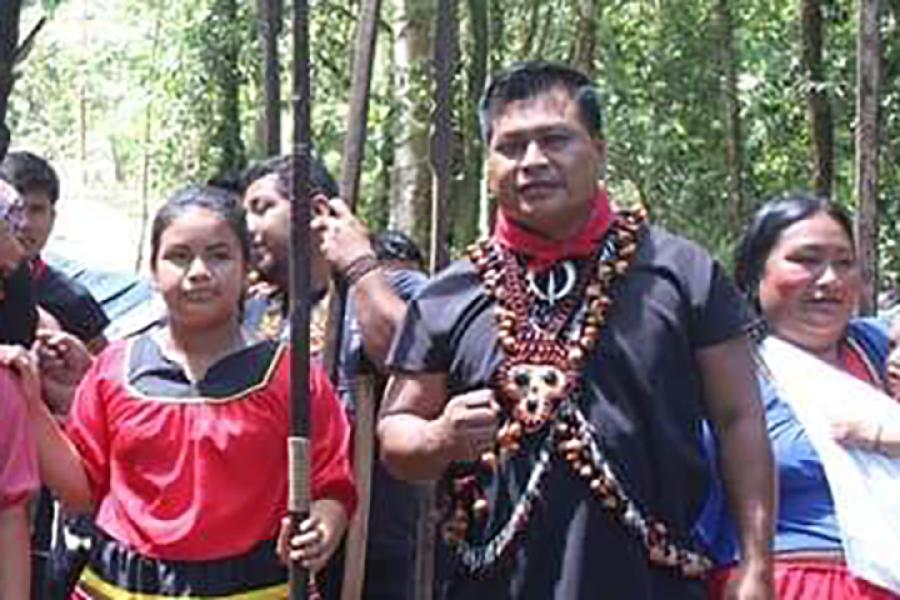While the rest of the country was celebrating Barack Obama’s electoral victory in November, incumbent Massachusetts congressman James McGovern was on a plane bound for one of the most remote places on the planet: Ecuador’s northern Amazon rainforest.
Coca, in Orellana province, and Lago Agrio (“Sour Lake”), in Sucumbios province, are at the hub of Ecuador’s oil industry, which was first discovered and exploited by Texaco (now owned by Chevron) in 1967. Texaco’s practice of dumping highly toxic chemicals into local river systems and into open holes that local people use for drinking water still wreaks a colossal human and environmental toll. It disproportionately affects the Cofán, Kichua, Secoyas, Huaroani, and other Indigenous Peoples living in the area. Each of these peoples had their numbers reduced from tens of thousands to a few hundred, and their cultures and communities have been steadily polluted by the destruction and temptations of major oil production in their midst.
In 1999, the Cofán’s first Western-educated community member, Randy Borman, wrote in the pages of this magazine, “In 1955, the Cofán people were the sole inhabitants of more than 1,000,000 hectares of pristine forest . . . . By 1965, oil exploration and exploitation had begun. And by 1975, the forest was fast disappearing before massive mestizo colonization, which was brought in by roads created to gain access to vast quantities of oil. The rivers were fouled with chemicals and raw crude; the animals disappeared; boom towns sprung up all over; and the Cofán struggled to survive on less than 15,000 hectares of badly degraded forest. The old life was gone forever, and my companions and I faced the numbing prospect of discarding our culture and way of life and becoming peasant farmers like so many others, trying to eke out a living from crops and animals that were never meant to grow in this environment. We had been powerless to maintain our forests in the face of outsider pressures to make every given piece of land profitable.”
The drilling has also unbalanced the Cofán spiritual world. The Cofán believe that inside the earth, there’s a landscape similar to this world, with trees, rivers, animals for hunting, and people, the Coancoans, who live like us but are bigger and who are the owners of the petroleum. The oil companies destroy the world below and kill the Coancoans. The knowledge that ensures the hunting and nourishment of the world above dies with them.
Much of Cultural Survival’s work in the 1980s and early 1990s focused on this disastrous scenario in Ecuador. We helped find funding to support a burgeoning indigenous rights movement in Ecuador that challenged the government’s decision to license millions more acres of pristine Amazon rainforest to foreign oil companies. Many other advocacy groups joined the fray, and in 1993, a class action lawsuit was filed in U.S. District Court in New York against Texaco on behalf of 30,000 Ecuadorans who have been affected by the environmental damage. In 2002, the court determined, without prejudice, that the case should be transferred to Ecuador because “it has everything to do with Ecuador and nothing to do with the United States.” It is now pending in Ecuador’s courts where a judge is expected to rule on it later this year.
Over the years, massive international interventions led to a new legal framework and improved oil company policies that have limited their most nefarious practices and prevented the recurrence of some of the worst environmental damage. A Cultural Survival-affiliated project encouraged dialogue between the companies, the government, and indigenous communities. Yet, as Jim McGovern found on his recent trip, the legacy from Texaco’s waste-dumping practices continues to pose grave harm to the health and well-being of Cofán and other Indigenous Peoples in the northern Amazon, many of whom traveled as much as six days to take part in the town meetings that the congressman hosted during his visit.
In a letter to President Obama written just after his return in November, McGovern reported, “The drinking water for thousands of poor people is horribly unfit, even deadly. Children are drinking and bathing in water that reeks of oil. In one village, San Carlos, I couldn’t come across a family that hadn’t been touched by cancer. Mothers brought their children to show me the terrible rashes and sores that covered their bodies. At an oil-well site known as Yuca-4, I talked with a farmer who lost many head of cattle because of the polluted water near the site and its pits, robbing his family of what little food and assets they had.”
McGovern’s deep commitment to helping people whose human rights are being violated predates his seven elections to the U.S. Congress. He is especially passionate about Latin America, where he led the investigation into the 1989 murders in El Salvador of six Jesuit priests and their housekeeper and her 15-year-old daughter, a case that led the U.S. Congress to cut off military aid and contributed to the success of a UN-brokered peace agreement in El Salvador in 1992, ending the country’s 12-year civil war.
In 2002, I had the honor to accompany him on his second trip to Colombia, where he was a guest at a social justice forum hosted by the country’s first indigenous elected state governor, Floro Tunubala of Cauca. He has returned to Colombia three times since to monitor the nearly $5 billion worth of U.S. military and police operations and investigate the human rights situation in violent regions throughout Colombia. On his trip to Ecuador, McGovern and his delegation met with representatives of 200,000 Colombian refugees, including many indigenous Colombians, who have fled across the border into Ecuador. The refugee situation further complicates resolution of the continuing environmental disaster in the region.
Visiting the Cofán in their homes made an especially deep impression on McGovern. After spending several hours in a village a couple of hours from Lago Agrio, he remarked, “I am especially grateful to the Cofán community at Dureno, who shared with me the difficult history of their village and the terrible impact oil exploitation has had on their traditions, livelihoods, health, and culture. They genuinely opened my eyes to an entire way of life that is struggling, but determined to survive.”
As Congressman McGovern’s letter to President Obama underscores, the human tragedy in Ecuador’s northern Amazon must not remain invisible. The appalling situation caused there by a U.S. corporation does have “to do with the United States,” and the United States should urgently work with the Ecuadorian government and the affected indigenous and other communities to fix it.
Congressman McGovern: For bearing witness and keeping the spotlight on the needs of Colombia’s and Ecuador’s Indigenous Peoples, Cultural Survival salutes you!



